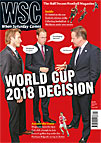 Dear WSC
Dear WSC
Howard Pattison (Sign of the times, WSC 286) wonders why there are so few official plaques to footballers in London, but goes on to answer his own question: most of the big names from the pre-war era were based in the north-west, and all the more recent players mentioned in the article died less than 20 years ago. The “20-year rule” – which applies to all suggestions made under the London-wide blue plaques scheme – is designed to ensure that the decision to commemorate an individual is a historical judgement, made with the benefit of hindsight. I could agree that Bobby Moore is as good a case as any for making an exception – but where, then, would you draw the line? The blue plaques scheme is run almost entirely on the basis of public suggestions. In recent years, considerable efforts have been made to increase the hitherto small number of nominations that have come in for sporting figures, including footballers. This has brought some success – Laurie Cunningham and Ebenezer Cobb Morley, the FA’s first secretary and author of the first football rulebook, are now on the shortlist for a blue plaque. As time goes on, more outstanding players and managers will become eligible for consideration, and surely join them. In view of this – and, among other projects, the involvement of English Heritage in the Played in Britain publications and website – the charge that “those who administer our heritage simply don’t see football as part of it” seems about as close to the target as a Geoff Thomas chip.
Howard Spencer, English Heritage
Search: ' Harrogate Town'
Stories
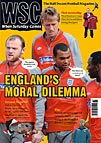 Dear WSC
Dear WSC
In response to my letter published in WSC 275, Mark Brennan Scott accepts that we send someone to each of the weekend’s Premier League games, to commentate live, but not unreasonably asks whether Match of the Day commentators ever “re-record bits they are unhappy with”. Not exactly, but the beauty of an edit rather than a live game is there is scope for tweaking both the sound and visuals by transmission time. Every now and then, a commentator will, for example, misidentify a goalscorer and then correct themselves, in which case we have been known to remove take one in the edit. I’ve found a copy of a letter I had published in WSC 240 in which I said: “If a commentator gets something wrong at the time we may even spare him his blushes at 10pm by removing the odd word.” That remains the case, but most of the time the commentator’s natural reaction works best. If it takes a couple of replays before they identify a deflection or suspicion of handball, that will nearly always feel more authentic than trying to look too clever after the event. In shortening a game for transmission, we may occasionally “pull up” a replay or remove a few words, but would almost never re-record any section of a commentary unless there’s been a technical problem. Furthermore, in all cases the commentators go home after the post-match interviews and a producer back at base edits the pictures and sound recorded at the time. In early days of the Premier League, only two or three games had multi-camera coverage and commentators present, so there were occasional attempts to add a commentary to single-camera round-up games, for example, for Goal of the Month. However, not every commentator was a convincing thespian and one or two “Le Tissier’s capable of beating three men from here and curling one into the top corner. Oh my word, he has…” moments did slip through. With multi-camera coverage and a commentator at every game, that no longer happens.
Incidentally, call us old-fashioned but there was a degree of pride in this office in MOTD’s recent use of “crashed against the timber” as cited in Steve Whitehead’s letter. Better that – or maybe “hapless custodian” – than some unpleasant modern notion like “bragging rights”.
Paul Armstrong, Programme Editor, BBC Match of the Day
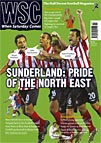 Dear WSC
Dear WSC
Bruce Wilkinson (WSC 267) pointed out that ticket queues “seem a quaint ritual of a bygone age”. Waiting in a virtual internet queue bears no similarity to lining up outside the box office. I have my tickets for the FA Cup final, but I do not feel as if I earned them. Instead of getting up in the middle of the night, crossing London, losing half a day’s work, standing in the rain shuffling forward inch by inch while nervous that there are too many punters and too few tickets, I merely sat in my dressing-gown in front the PC. There is no one to talk to in the “virtual waiting room”. Your opportunity is allotted randomly. Suddenly it’s all over and you have what you came for. One should be happier as the process is simple and efficient and the desired result achieved, but somehow it feels like a hollow victory as it lacks the sense of accomplishment joy and triumph of the old-fashioned process. You can’t even wave the tickets in triumph above your head as they are sent by post.Obviously my complaining about the changes that actually improve my life marks me down as “old”. I am not asking to bring back rickets and polio and to repeal the Factory Acts but I do miss a modicum of discomfort and inconvenience. The old experience was akin to standing on the terraces or being subject to the over-zealous policing that used to mark us out as a tribe. Under the new regime the tickets are yours if your broadband speed is faster and your credit card more golden than the next, rather than if you have more commitment stamina and perseverance.Will the ultimate progress be when we treat football like theatre and opera by dressing-up smartly for the occasion and ordering our interval drinks? Or is that Club Wembley?
Patrick Sheehy, London
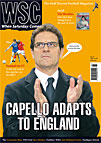 Ken Monkou was one of the first in a flood of Dutch players to move to Britain. Thomas Blom charts the career of one of football's unsung stars
Ken Monkou was one of the first in a flood of Dutch players to move to Britain. Thomas Blom charts the career of one of football's unsung stars
You may as well blame the Dutch for England failing to qualify for the European Championship finals. No fewer than 158 Dutchmen have come over to supplant local players since English clubs were permitted to sign foreigners in 1978. After George Boateng, the humble, uncapped Ken Monkou is the Dutchman who has made the most top-flight appearances (280 in total). Monkou joined Chelsea in 1989 and played 94 League games (two in Division Two) before moving on to Southampton. He was named player of the year by his club’s supporters no fewer than five times over the course of his career – twice at Chelsea and three times at Southampton – so it’s no wonder he likes life in England and has stayed put. From his base in Harrogate in the Yorkshire Dales (All Creatures Great and Small was always his favourite TV show), he keeps a distant eye on his recently purchased pancake restaurant in the Dutch town of Delft.
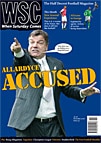 Dear WSC
Dear WSC
May I request that Derby fans who wish to profess their hatred for Nottingham Forest do so in a manner that doesn’t obstruct my view of the game? Perhaps a chant of “Sit down and fold your arms if you hate Forest” could be introduced. A new tune might be required to go along with these catchy lyrics, but I believe fellow Rams supporters would respond to this battle cry in overwhelming numbers. I know I would definitely join in, as I already spend most matches sitting down with my arms folded, conveniently enough.
Gavin Duenas, via email